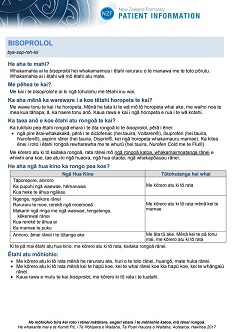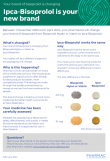November 2023: The funded brand of bisoprolol is changingFrom November 2023, a new brand of bisoprolol, Ipca-Bisoprolol will be funded. The Ipca brand has the same active ingredient and works the same way as the Mylan and Viatris brands. Find out more about Bisoprolol – your brand is changing.(external link) |
Bisoprolol is used to treat high blood pressure (hypertension) or to prevent chest pain (angina). It's also used with other medicines to treat heart failure. Bisoprolol works by slowing down your heart rate and making it easier for your heart to pump blood around your body. Read more about heart failure, high blood pressure and chest pain.









